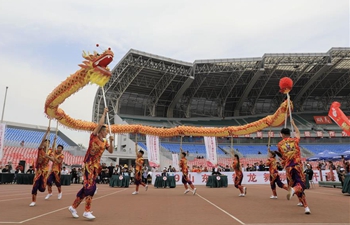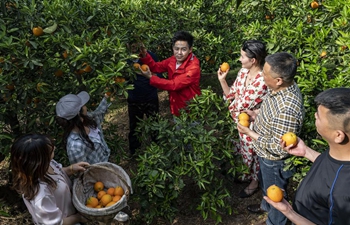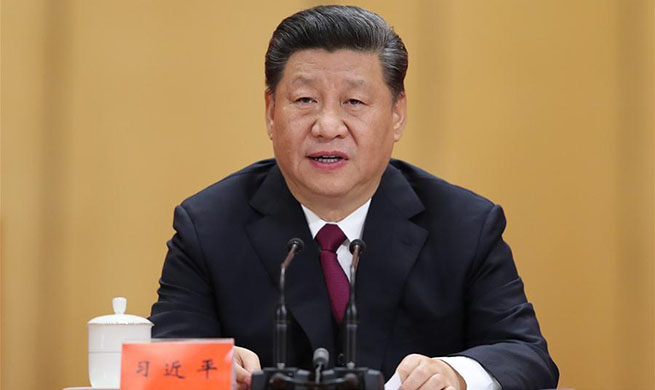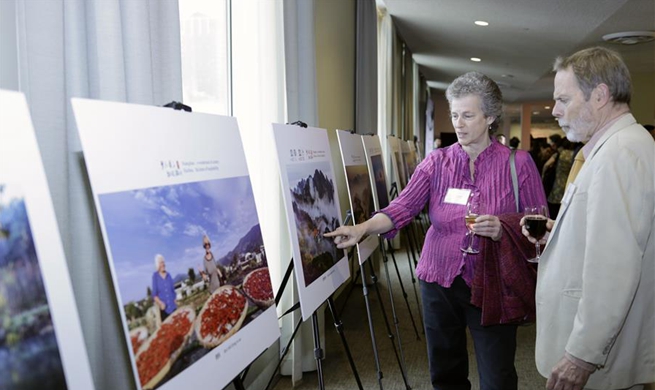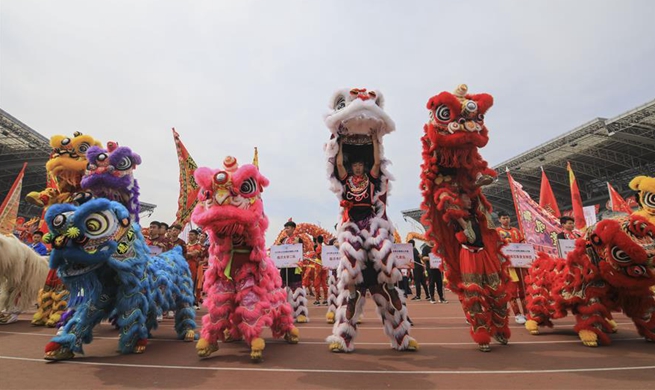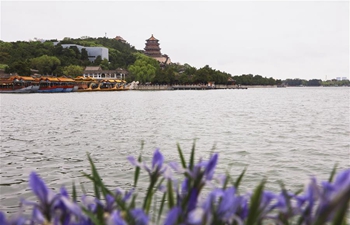by Julia Pierrepont III
LOS ANGELES, May 4 (Xinhua) -- The intricately-carved orb of a magical pumpkin glows a vibrant green as if suffused with life, a crystalline baby sleeps curled in sweet repose, and a forest of ruby-red flower petals yearn skyward from illuminated stems. Riots of colors swirl and dance - from the pristinely transparent, to luminous white, to electric blues and sunny yellows - all captured in stunning Liuli (colored glaze) sculptures that draw admiring crowds and the whir of press cameras.
It's all happening at an ongoing art exhibition in the U.S. city of Costa Mesa in southern California on Thursday, entitled "Goodbye Movies, Hello Liuli -- The Liuli Art of Loretta H. Yang and Chang Yi."
The show that kicked off on Thursday and will last until May 12 at South Coast Plaza, the largest shopping center on the U.S. West Coast, coincided with the plaza's Asian heritage month festivities.
Three blonde ladies who had gone through the exhibit together were enthralled. "It's beautiful!" said one. "So natural and spiritual," said the second. "It's one of the most amazing exhibits South Coast Plaza has ever had. Very Zen. Very special," said the third.
Loretta H. Yang, an award-winning film actress from China's Taiwan, co-founded with her husband Chang Yi, a renowned film director, the first contemporary Liuli art studio in Asia in 1987. Yang is a two-time winner of the Best Leading Actress award at the Golden Horse Awards and winner of the Best Actress prize at the Asia-Pacific Film Festival. They were at the height of their film careers in the late 1980s when they gave it all up to answer the siren call of a very different artform: Liuli.
The couple told media at the opening ceremony that they have been committed to the research and revival of the Liuli pate-de-verre technique that dates back to the Han Dynasty more than 2,000 years ago.
"It was important to us both to convey the profound essence of the Chinese culture and celebrate their artistic expression through the rich medium of Liuli," Yang told Xinhua.
"Our focus is not just pure artistic creation as modern artists. We want to connect more with the people by integrating traditional elements as well," added Chang.
Chang told Xinhua, "We are happy to have this exhibit in California. We would like to share the love and the wisdom behind Liuli with American audiences too."
The Shanghai and Taipei-based collaborators have exhibited their work in such prestigious institutions as the Palace Museum in Beijing, the Victoria and Albert Museum in London, Musee des Arts Decoratifs in Paris, the Bowers Museum in California, and the National Museum of Women in the Arts in Washington, D.C.
The entire display, including the curved wall enclosures and intricate pedestals and lighting effects were carefully designed by the artists themselves to an environment that does not just showcase the work, but becomes a holistic and integrated part of it.
Carmela Spinelli, a fashion historian visiting from the Savannah College of Art and Design in Atlanta, was astounded by the intricate beauty of the exhibition.
"I got chills walking through it," she told Xinhua. "The sense of tranquility, the exquisite glass sculptures, the videos, the matching Haiku poetry, the lighting, and even the bases the sculptures rest on are all finely conceived and integrated into an astoundingly complex, multi-faceted cohesive whole without a single jarring note. That makes your spirits soar."
One of the centerpieces of the exhibit, "Delivered to Great Love," is a red, 70-inch glass flower resting on a base that weighs over a ton with a Buddha's eye closed in meditation. In a nod to China's deep belief in the power of the collective, they crafted the flower not as one large sculpture, but as 17 distinct, sculpted petals and stems, which, when clustered together, create a single flawless bloom.
"This is a harmonious and mutually-beneficial relationship that does not focus on the self but on the greater good of everyone involved," explained the artists.
The exhibit gives art-lovers a much-needed sense of tranquility and peace. Thomas, an American man whose wife had owned an art gallery near San Francisco for years, said of the work, "We gravitated to Liuli as an artform. It has a strong spiritual element."
Marilyn, an acupuncturist and U.S. delegate to the World Health Organization, said of the work, "It has revived a type of artwork in China that has been lost for many centuries. In Western glass, only Lalique and Baccarat still survive. Liuli is a magnificent style of art that is based on the Chinese culture, which has so many layers to it - philosophically, spiritually, Feng Shui...It's all there."
Peter Keller, President of the Bowers Museum, told Xinhua, "We were the first museum to exhibit Loretta Yang in the United States. Now, you can see how far she's come and how well this work resonates with American audiences."
